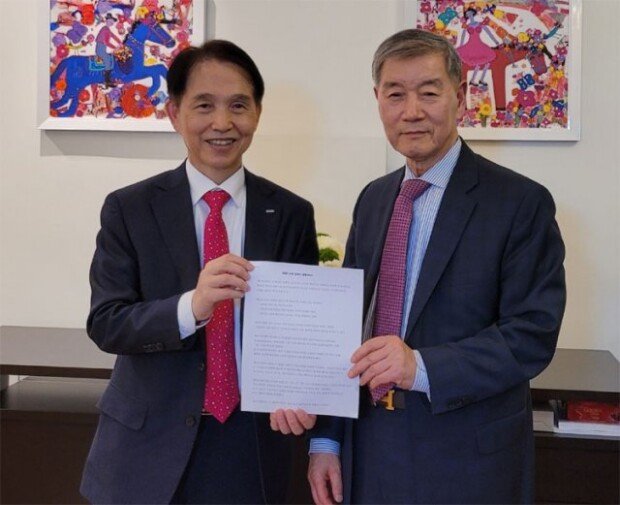KAIST to build New York-based business-like campus
KAIST to build New York-based business-like campus
Posted December. 13, 2021 07:47,
Updated December. 13, 2021 07:47

"The difference between KAISTians and students at Harvard and MIT is not their level of academic competence but how big dreams they pursue,” said KAIST President Lee Kwang-hyung at an online press conference held at New York U.N. Plaza Building in New York City on Thursday to announce the signing of an MOU on KAIST’s campus in New York – the first overseas campus of the national research university located in Daejeon, South Korea.
KAIST President Lee emphasized that students and professors at the university should not stay complacent with the title of the nation's best but pursue studies and research to help bring innovations to businesses from a global standpoint.
Global Leadership Foundation Chairman Bae Hee-nam donated money to this New York project. Arriving in the United States in 1981, Bae became a successful real estate investor. It has been reported that he will purchase and provide 33,000-square-meter land and buildings in Long Island, etc. to KAIST but it is not determined how much he will donate. "I'd like to make contributions to KAIST’s mission to nurture global leaders based on their competitiveness and excellence in AI and engineering technology,” Bae said.
KAIST expects that it will take two years at the earliest to open up a campus in New York by facilitating processes for college authorization, land purchase and so on. It intends to work on "Global Twin Strategy” by making use of this overseas stronghold to target both the U.S. and South Korean markets.
What makes New York the best place for KAIST to have a campus is that it can contribute to KAIST's efforts to increase competitiveness. "New York is the mecca for global culture, finance and bio industries,” he said. "By contrast, KAIST excels in cultural technology, art technology and cultural fields combining artificial intelligence and finance.”
Once the KAIST campus is built in New York, it will not only provide students and professors with opportunities to engage in global learning and international joint research projects but also help South Korean entrepreneurs make inroads into New York. "The New York campus will build an enterprise-type environment to contribute to research and education and create future value,” said the KAIST president. "The end goal is to make sure that South Korean businesses increase their competitiveness with the help of KAIST to go public on NASDAQ.”
Following the New York campus project, KAIST plans to open a new campus in Silicon Valley.
Myung-Hun Jee mhjee@donga.com




![“잠만 자면 입이 바싹바싹”…잠들기 전에 이것 체크해야 [알쓸톡]](https://dimg.donga.com/c/138/175/90/1/wps/NEWS/IMAGE/2026/02/23/133404747.3.jpg)

![[단독]타슈켄트 의대 한국인 유학생들, 국시 응시 1년 밀릴 듯](https://dimg.donga.com/c/138/175/90/1/wps/NEWS/IMAGE/2026/02/24/133411228.1.jpg)
